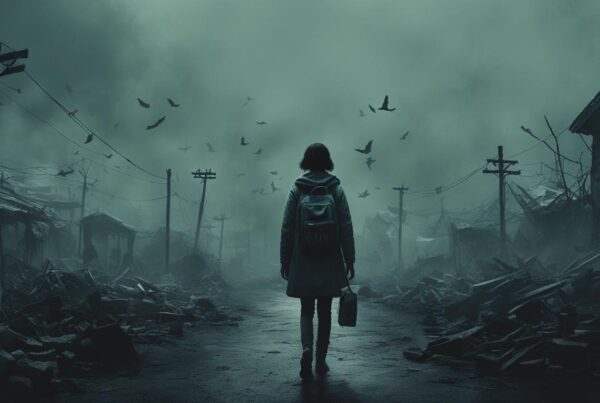If you’re a fan of spellbinding tales of adolescence and belonging, you won’t want to miss “The Girls” by Emma Cline in audiobook form. In this review, we’ll dive into the world of Evie Boyd and the mesmerizing experiences she faces as part of a cult in the late 1960s.
Cline’s poignant prose captures the teenage struggle to fit in and find purpose, highlighting the dangers and vulnerabilities that come with the search for identity and belonging. Whether you’re a fan of literary fiction, thrillers, or simply love a good coming-of-age story, “The Girls” is a must-listen.
Key Takeaways:
- “The Girls” by Emma Cline is a spellbinding coming-of-age story in audiobook form.
- Cline’s prose beautifully captures the complexities of adolescence, identity, and a sense of belonging.
- The audiobook brings the story to life with its talented voice actors and immersive narration style.
- “The Girls” has received critical acclaim and is a must-read for fans of literary fiction and thrillers.
- This novel explores themes of coming-of-age, identity, and belonging, making it a compelling listen for readers of all ages.
About the Author, Emma Cline
Emma Cline is an American author best known for her debut novel, “The Girls.” Born in California in 1989, Cline graduated from Middlebury College before attending the University of Edinburgh.
Cline’s writing style has been described as “strikingly lyrical” and “reminiscent of literary titans like Joan Didion and Vladimir Nabokov.” In addition to her novel, Cline has also written for publications such as The Paris Review and The New Yorker.
It’s worth noting that “The Girls” was not Cline’s first foray into fiction. In fact, she had been working on a novel for several years prior to its publication, only to ultimately abandon the project. However, the experience and influences gained during that time likely played a role in the creation of “The Girls.”
Influences and Inspiration
Like many writers, Emma Cline has cited a wide range of influences that helped shape her style and writing. Notable inspirations include Thomas Pynchon, Shirley Jackson, and J.D. Salinger, among others.
However, Cline has also spoken about the role that real-life events played in inspiring “The Girls.” The novel takes inspiration from the story of the Manson Family and the counterculture of 1960s California. By blending fact and fiction, Cline was able to create a compelling narrative that explores the darker side of adolescence and the search for belonging.
“Why does anyone want to be part of a group like that? There is never enough assurance in belonging, not enough proof against suspicion, against isolation.”
Plot Summary of “The Girls”
“The Girls” is a spellbinding novel that explores the themes of adolescence, belonging, and the quest for identity. The story follows Evie Boyd, a young girl growing up in 1960s California, who is drawn into a cult-like group called the “Girls.”
The novel is divided into two time periods: the summer of 1969 when Evie is 14 and the present day, where she is reflecting on the events that transpired. The bulk of the story takes place in 1969, where Evie’s desire for attention leads her to meet Suzanne, a captivating older girl who introduces her to the “Girls.”
The group is led by Russell, a charismatic but dangerous man who has a hold over the girls. Evie becomes increasingly involved with the group, drawn in by a sense of belonging, and the desire to be closer to Suzanne. As the story progresses, tensions rise, and the group becomes more violent, culminating in a horrific act that changes Evie’s life forever.
Throughout the novel, Cline uses masterful prose to examine the complex dynamics of power and control within relationships. Her vivid descriptions of the California landscape and the hippie culture of the time period transport readers back in time, creating a vivid sense of place.
“She was one of the rarities you sometimes see, a person who wanted something different from what she wanted.”
Despite the dark subject matter, “The Girls” is a compelling read that will keep readers on the edge of their seats. With its nuanced characters and exploration of the complexities of adolescence, this novel is a must-read for anyone looking for a thought-provoking and engaging read.
Narration Style in the Audiobook Version
One of the unique elements of “The Girls” is the audiobook adaptation, which offers listeners a different take on the story and characters. In this section, we’ll explore the narration style and what listeners can expect from the audiobook version.
Voice Actors Bring Characters to Life
The audiobook version of “The Girls” features a talented cast of voice actors who bring each character to life in a distinctive way. From the protagonist, Evie, to the members of the cult she becomes involved with, each voice captures the nuances and emotions of the characters.
Enhancements to the Overall Experience
The audiobook format also adds a new dimension to the overall reading experience of “The Girls.” Sound effects and music are occasionally used to enhance the mood and atmosphere of the story, immersing the listener in the world of the novel. The audiobook also allows listeners to multitask, enjoying the book while doing other tasks such as driving, exercising, or cooking.
“The audiobook version of ‘The Girls’ offers a fresh perspective on Emma Cline’s spellbinding novel, with talented voice actors bringing the story and characters to life in a new way.”
Overall, the narration style in the audiobook version of “The Girls” adds a new layer to an already captivating novel, making it a great choice for those who enjoy audiobooks or those looking to experience the story in a new way.
Themes Explored in “The Girls”
One of the most captivating aspects of “The Girls” by Emma Cline is the way it explores various themes that are relatable to readers of all ages. From the struggles of adolescence to the search for identity and belonging, the narrative touches on profound issues that have been a part of the human experience for centuries.
The Girls is a coming-of-age novel that depicts the harrowing trials and tribulations of a teenage girl, Evie, who struggles with feelings of disillusionment and loneliness. Set against the backdrop of the 1960s, the novel explores the corrosive power of cult indoctrination, the challenges of building meaningful friendships, and the crushing realities of unrequited love.
Throughout the novel, readers are reminded of the importance of self-discovery and self-knowledge. The journey towards belonging is often littered with obstacles, and Cline masterfully explores the various ways in which human beings cope with rejection, disappointment, and fear.
The Power of Groupthink
“We were proving ourselves, making our own reality. The world was strong and wild and dangerous – just like us.”
One of the primary themes in “The Girls” by Emma Cline is the seductive power of groupthink. The novel takes a candid look at the ways in which people are drawn to cults and extremist ideas, often in search of a sense of belonging. Cline invites readers to examine the psychology of group dynamics, reminding us that a sense of community can be both liberating and dangerous.
The Struggle for Identity
“I shook my head. It was like I wanted to be close to them but also to keep them away.”
“The Girls” also tackles the issue of identity, and the many ways in which individuals are forced to navigate societal expectations, pressures, and norms. Through Evie’s journey, readers are reminded of the importance of self-discovery and self-understanding. The novel explores how the fear of being misunderstood or excluded often leads people to put on masks and hide their true selves from the world.
The Pain of First Love
“…I was quiet enough that he’d forgotten about me. I felt better, as if I’d passed some test and was now allowed to exist.”
“The Girls” also delves into the topic of first love, painting a poignant picture of teenage angst and unrequited desire. The novel illuminates the intense emotional turbulence that accompanies first love, the despair of rejection, and the pangs of infatuation. Through Evie’s perspective, the reader is reminded of the exquisite, sometimes painful, nature of adolescent love.

Overall, “The Girls” is a masterful work that explores a wide array of themes with sensitivity and insight. Emma Cline’s storytelling artistry elevates the novel above a typical coming-of-age story, and will undoubtedly resonate with readers of all ages and experiences.
Writing Style and Language in “The Girls”
Emma Cline’s writing style in “The Girls” is a standout feature of the novel. Her unique prose and descriptive abilities leave a lasting impression on readers, drawing them into the world of the story. The language used by Cline is both poetic and accessible, making it an easy and enjoyable read.
In addition to her beautiful language, Cline employs a range of literary techniques to captivate her audience. The novel is told from the perspective of Evie, the protagonist, and the use of first-person narration allows readers to intimately experience her journey. Cline also weaves in flashbacks and alternating timelines, creating a sense of tension and suspense throughout the story.
“Cline’s writing is a masterclass in how to convey complexity with clarity, leaving no emotion unturned in the process.”
Overall, the writing style and language in “The Girls” are major strengths of the novel. It’s no wonder that this book has received such critical acclaim and captivated readers around the world.
Reception and Critical Acclaim of “The Girls”
Since its publication in 2016, “The Girls” by Emma Cline has received widespread critical acclaim, garnering reviews from some of the most respected publishers and literary voices in the world.
The New York Times Book Review called the novel “a brilliant and immersive debut,” while The Guardian praised Cline’s “authentic voice” and “flair for storytelling.” The novel was a finalist for the John Leonard Prize, the National Book Critics Circle’s 2016 Award for Best First Book, and the PEN/Robert W. Bingham Prize for Debut Fiction.
Despite the critical acclaim, the book was not without controversies and stirred some debates. Some critics argue that the novel romanticizes the murders committed by the Charles Manson followers.
Nevertheless, “The Girls” continues to inspire and provoke readers, solidifying its place as a modern classic in coming-of-age literature.
Comparison to Other Works in the Genre
While “The Girls” by Emma Cline stands out as a unique work of fiction, it is not the only novel to explore the themes of adolescence and belonging. Similar novels include “The Virgin Suicides” by Jeffrey Eugenides and “The Bell Jar” by Sylvia Plath. Both of these works also feature young female protagonists struggling to find their place in the world.
However, what sets “The Girls” apart is its masterful storytelling and unique perspective on the coming-of-age experience. Cline’s prose is both evocative and poetic, drawing readers in with her vivid descriptions and honest portrayals of complex emotions.
“Cline’s ability to capture the essence of teenage angst and the yearning for acceptance is unparalleled. Her writing is both raw and beautiful, making “The Girls” a must-read for fans of the genre.”
In addition, “The Girls” has garnered critical acclaim and numerous awards, cementing its place as a modern classic. It has been compared to other notable works such as “Less Than Zero” by Bret Easton Ellis and “The Secret History” by Donna Tartt, cementing its status as a significant contribution to the literary world.
Comparison of “The Girls” to Similar Novels
| “The Girls” by Emma Cline | “The Virgin Suicides” by Jeffrey Eugenides | “The Bell Jar” by Sylvia Plath | |
|---|---|---|---|
| Themes | Adolescence, belonging, identity | Adolescence, loss, family | Mental health, identity, society’s expectations |
| Main Protagonist | 14-year-old Evie Boyd | The five Lisbon sisters | Esther Greenwood |
| Critical Acclaim | Finalist for the Pulitzer Prize, winner of several other literary awards | Notable debut novel, adapted into a film by Sofia Coppola | Became a classic of American literature, studied in universities worldwide |
Conclusion
Overall, “The Girls” by Emma Cline is a must-read for fans of coming-of-age novels and those interested in exploring themes of belonging and adolescence. The audiobook version enhances the experience with its talented voice actors, adding a new layer of depth to the story.
Cline’s writing style is both captivating and visceral, transporting readers to a different time and place. Her descriptive abilities and use of literary techniques make for a truly immersive reading experience.
While “The Girls” has received some criticism for its portrayal of certain characters and events, it has also received critical acclaim and numerous awards. It is undoubtedly a novel that has made an impact on the literary world.
If you’re looking for a thought-provoking and immersive read, “The Girls” is certainly worth adding to your reading list.
FAQ
Can you give a brief audiobook review of “The Girls” by Emma Cline?
“The Girls” by Emma Cline is a spellbinding tale of adolescence and belonging. It explores the themes of coming-of-age struggles and the search for identity in a captivating way. The audiobook version is a great way to immerse yourself in the story and experience the narrative in a unique format.
Who is the author of “The Girls”?
“The Girls” is written by Emma Cline, a talented author known for her evocative storytelling and compelling narratives. Her writing style brings depth and emotion to her works, making them highly engaging for readers.
Can you provide a plot summary of “The Girls”?
“The Girls” follows the story of Evie Boyd, a fourteen-year-old girl captivated by a group of girls she encounters in her California town in the late 1960s. Drawn into their mesmerizing world, Evie becomes involved in a dangerous cult and experiences a journey of self-discovery, love, and ultimately, redemption.
How is the narration style in the audiobook version of “The Girls”?
The audiobook version of “The Girls” features talented voice actors who bring the characters to life with their captivating performances. Their narration adds depth and emotion to the story, enhancing the overall listening experience.
What are the main themes explored in “The Girls”?
“The Girls” delves into themes of adolescence, belonging, and the quest for identity. It explores the struggles and challenges faced by young girls in search of their place in the world. The novel also touches on the power dynamics within cults and the consequences of blind devotion.
How would you describe the writing style and language used in “The Girls”?
Emma Cline’s writing style in “The Girls” is mesmerizing and poetic. Her vivid descriptions and evocative language bring the story to life, immersing readers in the 1960s setting. She employs literary techniques such as vivid imagery and metaphorical language to create a captivating reading experience.
What is the reception and critical acclaim of “The Girls”?
“The Girls” has received widespread critical acclaim since its publication. It has garnered positive reviews from readers and critics alike, praising Cline’s skillful storytelling and her ability to capture the complexities of adolescence. The novel was also a New York Times Best Seller and was shortlisted for several prestigious literary awards.
How does “The Girls” compare to other works in the same genre?
“The Girls” stands out among other works in the coming-of-age genre with its unique exploration of adolescence and its lyrical prose. It can be compared to other novels that delve into themes of belonging and self-discovery. However, Cline’s profound storytelling sets “The Girls” apart and makes it a standout work in its own right.
Would you recommend the audiobook version of “The Girls”?
Absolutely! The audiobook version of “The Girls” is a wonderful way to experience the story. The talented voice actors bring the characters to life, adding an extra layer of immersion to the narrative. It is highly recommended for those who enjoy captivating coming-of-age tales and are looking for a unique audiobook experience.



